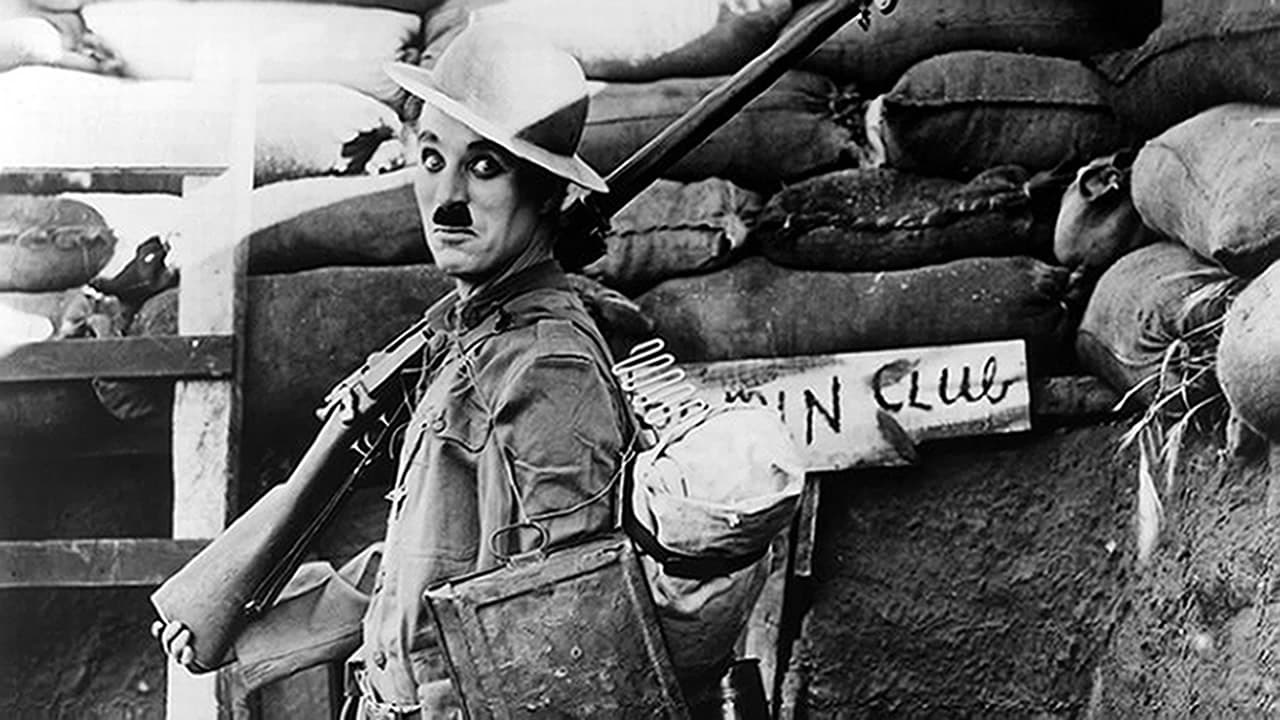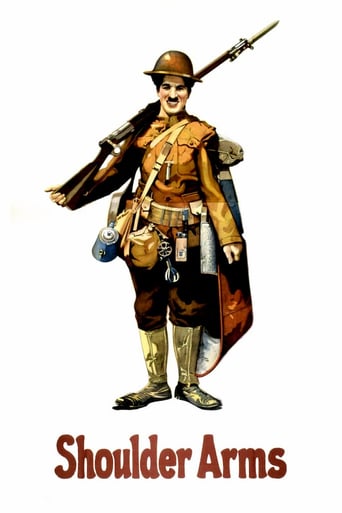



Lack of good storyline.
A Masterpiece!
The movie really just wants to entertain people.
A movie that not only functions as a solid scarefest but a razor-sharp satire.
View MoreIt's really amazing, how timeless this movie is. This is the first Chaplin movie that I saw (and I intend to watch more), I was blown away to how funny it still is, with already 100 years-old! I think that this is probably the main characteristic of a classic (or a masterpiece), it's a movie that doesn't matter when you see it, it stills good. And Shoulder Arms is definitely one of those cases.The humor here is silly, but at the same time is also really clever, and this is my favorite aspect of it. At the end, is hard to judge something that old, I really don't have a clear path in mind of how to rate something like that, so I don't know, I might be being unfair or overvaluing it, so, anyway, you really must see it, in order to see what is your opinion about it.Probably the only thing that bother me sometimes was the score, it repeats a lot, but, again, I get all the scenario behind the production (age, technology).In short, I think that Shoulder Arms is a classic, timeless, and Chaplin is definitely one of the most influential people in film story, if you see guys like Johnny Depp out there today and likes it, you had to thanks Charlie for that.
View MoreShortly before the end of World War I, Charlie arrives as a recruit at the front. First, he waddles patrolling through the trenches, carefree as always, but after a while the hand grenades that keep exploding around him DO make him feel a little uneasy, and he starts dreaming of home... However, there he is now in France, ready to fight the German enemy (whose troops are being presented, of course, at their most ridiculous - a microscopic officer shouting at his huge soldiers, all wearing spiked helmets and groveling before the ridiculous little guy!) And soon Charlie develops into a fearless hero: he captures 13 enemy soldiers (and declares: 'I surrounded them!'), then he becomes a first-class shot, and then he volunteers for a dangerous mission - and only starts feeling a little uneasy when he's told that he might never return... But, there he goes, disguised as a tree trunk, to spy on the German soldiers in the woods, playing hide-and-seek with the dumb 'krauts'; while his best friend, on another dangerous mission overhearing the Germans' conversations and telegraphing their plans to his comrades, is captured...Charlie, meanwhile, finds refuge in the bombed-out house of a pretty young French girl (Edna Purviance, of course) - but not for long, until both are captured and brought before the ridiculous and lustful German officer; and then the Kaiser himself (played once again by Charlie's brother Sydney, who also plays his comrade!) pays a visit to the troops - but what does Charlie do to him?? See for yourself - you won't believe it...Hearing about this hilarious plot, it may seem a bit strange and maybe even tasteless to make such a 'light' comedy about War, and even while the REAL War is still going on - and yet, Charlie once more makes the whole thing look so natural, with all the realistic elements of the trenches, the bombed-out houses, the shooting, the explosions... and AMIDST all that, his gags work just like always! Of course, the War was almost over, and victory was already guaranteed; and so, Charlie was now (after he'd made REAL efforts to help the US army, selling War Bonds and making educational shorts on his own expenses) able to show all the absurdity of war in the shape of a simply HILARIOUS comedy - certainly one of the BEST he produced for First National! A historical document today - and at the same time a WONDERFULLY crazy piece of entertainment...
View MoreHalfway between a short and a feature, Shoulder Arms is a comedy about army life and war on the Western Front. It is certainly unusual for such a film to be made during a war, even if it were done towards the war's end (released in October 1918). Apparently the film was edited down from nearly feature length, as there are not always smooth changes from one scene to another. Despite these shortcomings, Chaplin again demonstrates his creative comic genius that began in 1914 (ironically, at the beginning of the war). A few years later, Chaplin will begin writing, directing, and acting in a string of notable silent features, like The Kid (1921), The Gold Rush (1925), The Circus (1928), and City Lights (1931).Shoulder Arms is divided into three segments of unequal length: (1) Military induction/physical examination, (2) Military training/ boot camp, and (3) Combat. Inadvertently signed on to the US army, recruit Charlie Chaplin – a four-F if there ever was one – drives his military instructor mad as he is unable to drill the army way in boot camp. He even walks like the little tramp! One thinks about the great future comedians who later followed the comedic army act, like Laurel and Hardy, the Three Stooges, and Abbot and Costello. Somehow our recruit passes military drill and moves on to the front lines in France, but his situation is not much better. For now he is dealing with the travails and deprivations of foxhole life, including unsanitary conditions and a flooded trench. The latter finds him sleeping (with ingenuity) below the surface! There are other great gags as well, and there is no need to go into them here. The activities inside the German trench across the battlefield are equally uproarious.The film shows the Germans to be even more incompetent than Charlie. On the battlefield Charlie will capture a 13-man German squad, while encountering the shortest German officer of the war (his explanation: "I surrounded them."). Later Charlie volunteers to undertake a dangerous mission behind enemy lines, disguises himself as a tree, and spies on the Germans. He impersonates a German officer, and hilariously fakes beating up a captured American soldier. Charlie meets a French farm girl and hides in her house; she will help him with his encounters with the enemy. Soon they wind up capturing both the German Crown Prince and the Kaiser! Wow! Then he awakens. Poof!
View MoreThis film as it is now is far shorter than it was when released in 1918. In fact, it is now more available with two other medium sized silent Chaplin features (A DOG'S LIFE, and THE PILGRIM) that Chaplin re-released in the 1950s. In it's day SHOULDER ARMS was a big hit because of it's humor in uniform approach. It still is very funny (Chaplin in disguise as a tree, spying on the Germans, is so ridiculous it's hysterical), but it suffers from being set in it's own age. Charlie's dealing with World War I, a hideous conflict that killed 20 million people, but not the worst war (horrible to say) of the 20th Century. Chaplin would live to see that war too, and would spoof it's main architects in THE GREAT DICTATOR. But the latter is more accessible to modern audiences because that movie is a talking picture. Also, Hitler as a target seems more important to audiences in 2008 than Kaiser Wilhelm II and his general staff.SHOULDER ARMS was to take us through the drafting of the tramp, his training, his getting use to trench warfare, and his actual fighting against the "Huns" on the Western Front. Much of this is now gone - one segment (when Albert Austin is a Doctor examining Chaplin in his office at the draft center) is still in existence and was shown completely in the documentary UNKNOWN CHAPLIN. This is unfortunate, because the film is now roughly forty five minutes long, and there seems to be gaps that these scenes filled out. What remains is first rate but one leaves wanting more...and feeling a trifle cheated.Sydney Chaplin and Henry Bergman do well in supporting parts, especially Sydney as Wilhelm. He had done it before in a short with Charlie for the sale of bonds, giving a militaristic speech before being clobbered by the tramp with a huge hammer labeled "War Bonds"). Here we see the tramp succeed in capturing Wilhelm and the general staff at the conclusion. It was only topped by Stan and Ollie capturing the German army with a tank and barbed wire in PACK UP YOUR TROUBLES.The funny thing is that Chaplin actually had a major crisis as a result of his wartime activities. He was not a naturalized American - not in 1917 or in 1952, when Attorney General McGranery publicly announced that Chaplin could not return to the U.S. because he was an enemy alien (Chaplin and his family were in Europe on a trip - in anger Charlie settled in Switzerland for the rest of his life, except when he made A COUNTESS FROM HONG KONG and when he went to Hollywood for his special career "Oscar" in the 1970s). Because he was not an American he could not be drafted by the U.S. So he sold (with Douglas Fairbanks Sr. and Mary Pickford) U. S. War Bonds. But in Great Britain tens of thousands had perished in World War One battlefields, and the public there was upset at Chaplin, who they considered a "slacker" and a coward. Chaplin eventually did overcome this, but remnants of the resentment followed him until he died. This does not detract from the success of SHOULDER ARMS as a film, but it does suggest why Chaplin did not do another modern war film until 1940, and a worthier target.
View More